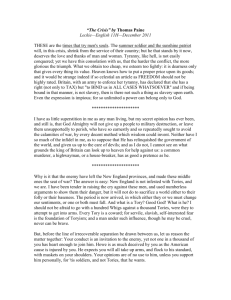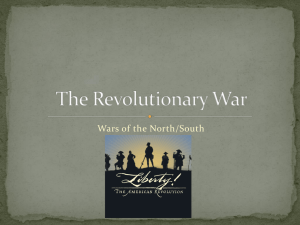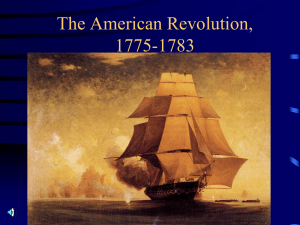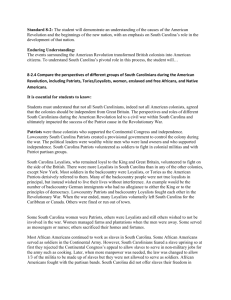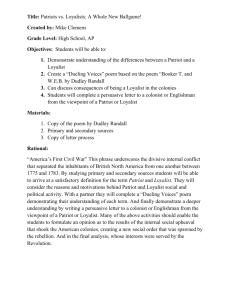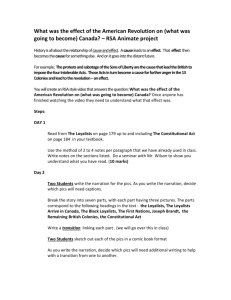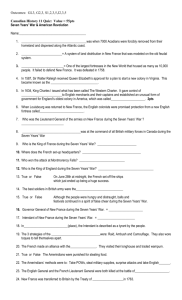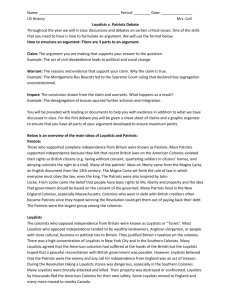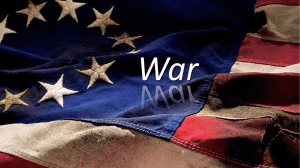The American Revolution is often remembered as a War for
advertisement
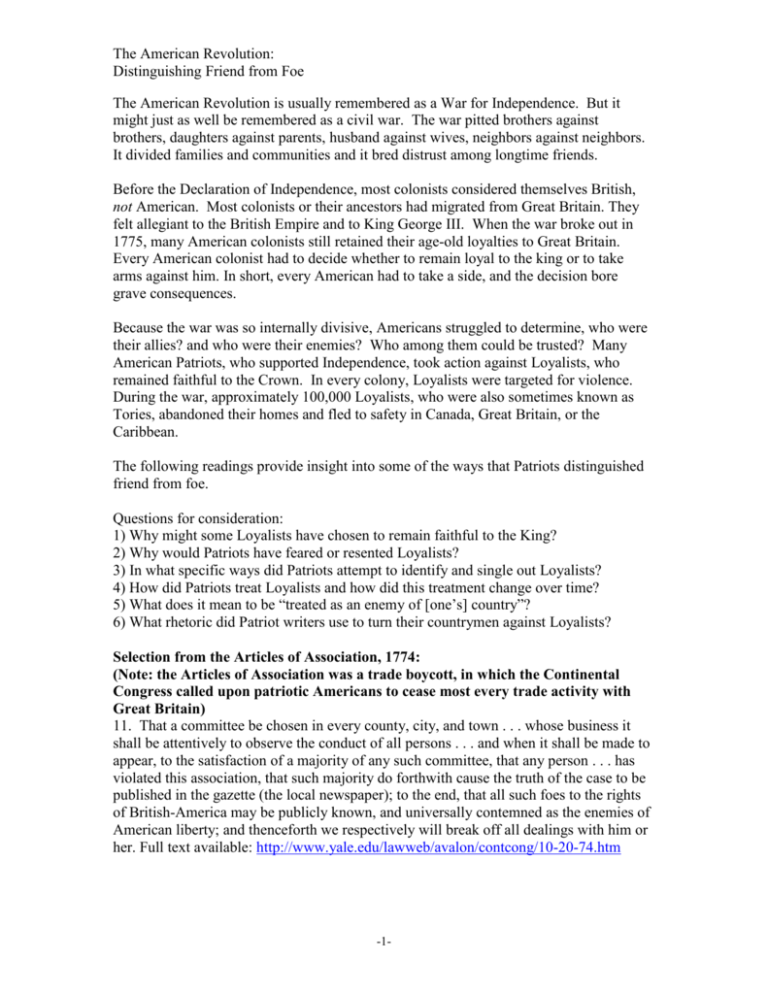
The American Revolution: Distinguishing Friend from Foe The American Revolution is usually remembered as a War for Independence. But it might just as well be remembered as a civil war. The war pitted brothers against brothers, daughters against parents, husband against wives, neighbors against neighbors. It divided families and communities and it bred distrust among longtime friends. Before the Declaration of Independence, most colonists considered themselves British, not American. Most colonists or their ancestors had migrated from Great Britain. They felt allegiant to the British Empire and to King George III. When the war broke out in 1775, many American colonists still retained their age-old loyalties to Great Britain. Every American colonist had to decide whether to remain loyal to the king or to take arms against him. In short, every American had to take a side, and the decision bore grave consequences. Because the war was so internally divisive, Americans struggled to determine, who were their allies? and who were their enemies? Who among them could be trusted? Many American Patriots, who supported Independence, took action against Loyalists, who remained faithful to the Crown. In every colony, Loyalists were targeted for violence. During the war, approximately 100,000 Loyalists, who were also sometimes known as Tories, abandoned their homes and fled to safety in Canada, Great Britain, or the Caribbean. The following readings provide insight into some of the ways that Patriots distinguished friend from foe. Questions for consideration: 1) Why might some Loyalists have chosen to remain faithful to the King? 2) Why would Patriots have feared or resented Loyalists? 3) In what specific ways did Patriots attempt to identify and single out Loyalists? 4) How did Patriots treat Loyalists and how did this treatment change over time? 5) What does it mean to be “treated as an enemy of [one’s] country”? 6) What rhetoric did Patriot writers use to turn their countrymen against Loyalists? Selection from the Articles of Association, 1774: (Note: the Articles of Association was a trade boycott, in which the Continental Congress called upon patriotic Americans to cease most every trade activity with Great Britain) 11. That a committee be chosen in every county, city, and town . . . whose business it shall be attentively to observe the conduct of all persons . . . and when it shall be made to appear, to the satisfaction of a majority of any such committee, that any person . . . has violated this association, that such majority do forthwith cause the truth of the case to be published in the gazette (the local newspaper); to the end, that all such foes to the rights of British-America may be publicly known, and universally contemned as the enemies of American liberty; and thenceforth we respectively will break off all dealings with him or her. Full text available: http://www.yale.edu/lawweb/avalon/contcong/10-20-74.htm -1- The American Revolution: Distinguishing Friend from Foe Selection from the Journals of the Continental Congress concerning the new continental currency, January 1776: Whereas it appears to this Congress, that several evil disposed persons, in order to obstruct and defeat the efforts of the United Colonies, in the defence of their just rights, have attempted to depreciate the bills of credit emitted by the authority of this Congress (the continental currency), Resolved, therefore, That if any person shall hereafter be so lost to all virtue and regard for his country, as to "refuse to receive said bills in payment," . . . such person shall be deemed, published, and treated as an enemy of his country, and precluded from all trade or intercourse with the inhabitants of these colonies. Full text available: http://memory.loc.gov/cgibin/query/r?ammem/hlaw:@field(DOCID+@lit(jc00415)) Selection from the journal of Janet Schaw, a Scottish woman traveling through the Carolina backcountry between 1774-76: At present the martial law stands thus: An officer or committeeman enters a plantation with his posse. The Alternative is proposed, Agree to join us, and your persons and properties are safe; you have a shilling sterling a day; your duty is no more than once a month appearing under Arms at Wilmingtown, which will prove only a merry-making, where you will have as much grog as you can drink. But if you refuse, we are directly to cut up your corn, shoot your pigs, burn your houses, seize your Negroes and perhaps tar and feather yourself . . . I believe this method has seldom failed with the lower sort. Full text available: http://www.ah.dcr.state.nc.us/SECTIONS/hp/Colonial/Bookshelf/Schaw/chap3.htm Selection from a letter to the editor of the Pennsylvania Packet, published by “A Whig,” August 5, 1779: I can no longer be silent on this subject, and see the independence of my country . . . endangered by internal enemies. Rouse, America! your danger is great—great from a quarter where you least expect it. The Tories—the Tories will yet be the ruin of you. ’Tis high time they were separated from among you. They are now busily engaged in undermining your liberties. They have a thousand ways of doing it, and they make use of them all. Who were the occasion of this war? the Tories. Who persuaded the tyrant of Britain to prosecute it in a manner before unknown to civilized nations and shocking even to barbarians? the Tories. Who prevailed on the savages of the wilderness to join the standard of the enemy? the Tories. Who have assisted the Indians in taking the scalp from the aged matron, the blooming fair one, the helpless infant, and the dying hero? the Tories. Who advised, and who assisted in burning your towns, ravaging your country, and violating the chastity of your women? the Tories. Who are the occasion that thousands of you now mourn the loss of your dearest connections? the Tories. Who have always counter-acted the endeavours of Congress to secure the liberty of this country? the Tories. Who refused their money when as good as specie, though stamped with the image of his most sacred Majesty? the Tories. Who continue to refuse it? the Tories. Who do all in their power to depreciate it? the Tories. Who propagate lies among us to discourage the -2- The American Revolution: Distinguishing Friend from Foe Whigs? the Tories. Who corrupt the minds of the good people of these States by every species of insidious counsel? the Tories. Who hold a traiterous correspondence with the enemy? the Tories. Who daily send them intelligence? the Tories. Who take the oaths of allegiance to the States one day, and break them the next? the Tories. Who prevent your battalions from being filled? the Tories. Who dissuade men from entering the army? the Tories. Who persuade those who have enlisted to desert? the Tories. Who harbour those who do desert? the Tories. In short, who wish to see us conquered, to see us slaves, to see us hewers of wood and drawers of water? the Tories . . . ’Tis time, my countrymen, to rid ourselves of these bosom-vipers. An immediate separation is necessary. I dread to think of the evils every moment is big with, while a single Tory remains among us. May we not soon expect to hear of plots, assassinations, and every other species of wickedness their malice and rancour can suggest? . . . Awake, Americans, to a sense of your danger. No time is to be lost—Instantly banish every Tory from among you. Let these walls, let America be sacred alone to freemen. Drive far from you every baneful wretch who wishes to see you fettered with the chains of tyranny. Send them where they may enjoy their beloved slavery in perfection. Send them to the island of Britain, there let them drink the cup of slavery and eat the bread of bitterness all the days of their existence— There let them drag out a painful life, despised and accursed by those very men whose cause they have had the wickedness to espouse—Never let them return to this happy land—Never let them taste the sweets of that independence which they strove to prevent—Banishment, perpetual banishment, should be their lot. Full text available: http://teachingamericanhistory.org/library/index.asp?document=883 -3- The American Revolution: Distinguishing Friend from Foe The Alternative of Williams-burg (1775). Printed in London, this cartoon depicted the choice, or alternative, faced by townsfolk in Williamsburg, Virginia. They could sign the Association, agreeing not to trade with Britain, or, if they refused, armed “Liberty Boys” would lead them to the gallows, where a barrel of tar and a bag of feathers awaited. Compare this “alternative” with the “alternative” described by Janet Schaw. Image available: http://lcweb2.loc.gov/cgibin/query/I?fsaall,app,brum,detr,swann,look,gottscho,pan,horyd,genthe,var,cai,cd,hh,yan, bbcards,lomax,ils,prok,brhc,nclc,matpc,iucpub,tgmi,lamb,:1:./temp/~pp_wwiE::displayT ype=1:m856sd=cph:m856sf=3g05280:@@@mdb=fsaall,app,brum,detr,swann,look,gotts cho,pan,horyd,genthe,var,cai,cd,hh,yan,bbcards,lomax,ils,prok,brhc,nclc,matpc,iucpub,tg mi,lamb, -4- The American Revolution: Distinguishing Friend from Foe Many Loyalists were forced to publish apologies for their crimes in local newspapers. In this advertisement, published in the Virginia Gazette in 1775, the Loyalist offender announces his intention to leave the colony. The article that follows explains that the Loyalist was tried and convicted—not by a court of justice but rather by local militia volunteers—of “speaking of the cause of America in a most disgraceful and menacing manner.” For this crime, he was banished from the colony. -5- The American Revolution: Distinguishing Friend from Foe This watercolor depicts a Loyalist refugee camp on the St. Lawrence River in Canada. Fleeing Loyalists arrived in Canada with little property and no guarantees from the British government. Image available: http://www.archives.gov.on.ca/english/exhibits/agriculture/big/big_17_loyalist_encampment.htm Questions for students: 1) Why would Loyalists leave their homes and families for an uncertain life in Canada? 2) What hardships would the Loyalists have faced in Canada? 3) Why did few Loyalists choose to return to their homes after the Revolutionary War had ended? -6- The American Revolution: Distinguishing Friend from Foe Entitled Shelb—n’s Sacrifice, this political cartoon was published in England shortly after the war. The Treaty of Paris in 1783, which concluded the war, required the U.S. Congress only to recommend that Loyalists be protected and their property returned. The creator of this cartoon blamed the British Prime Minister, Lord Shelburne, for exposing Loyalists to the violent retribution of Patriots. Here, the cartoonist depicts American Patriots as “savages” committing cruel acts against helpless Loyalists. One Loyalist in the upper left cries, “Ungrateful Britain to Abandon your Loyal Friends.” The Patriots, depicted as Indians, sing the praises of Lord Shelburn, who watches on. The woman on the right, dressed in flowing robes, is Britannia, who represents the British nation. Here, Britannia angrily stabs Lord Shelburne with her spear. She declares, “Inhuman smiling Hypocrite thus to disgrace my unsullied fame.” Image available: http://lcweb2.loc.gov/cgi-bin/query/h?pp/PPALL:@field(NUMBER+@1(cph+3a05330)) -7-
